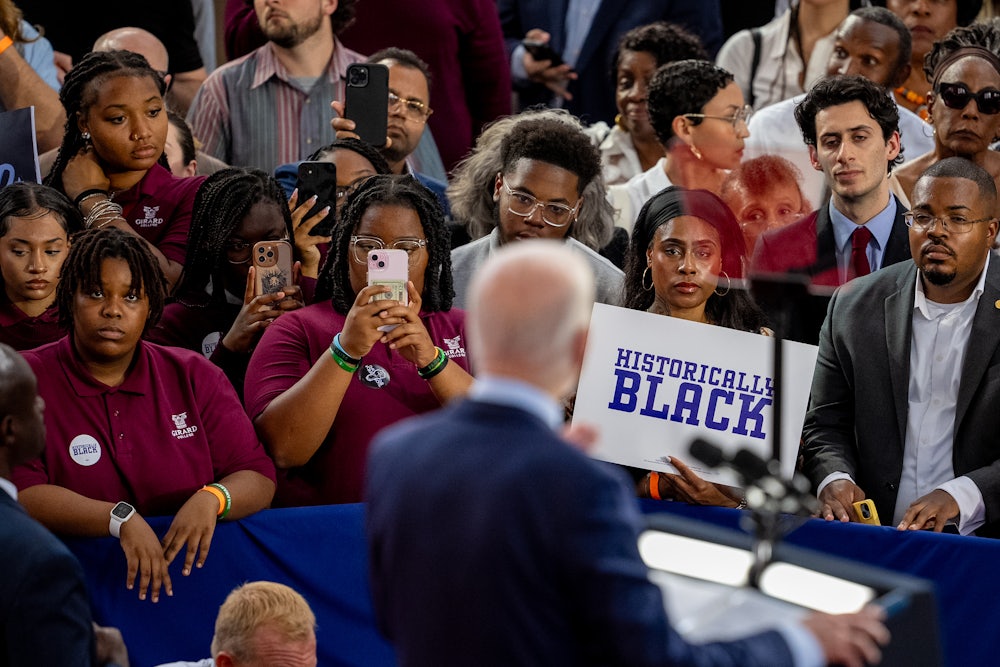The polling was jarring, and the political narrative too juicy to resist. Stoked by surveys showing him getting as much as 23 percent of the Black vote, Donald Trump, with characteristic hubris, claimed he was capturing the Democrats’ most reliable base voters, trotting out supporters in “Blacks for Trump” T-shirts and holding what is typically an exclusively Democratic event—a rally in a Black Detroit church. The headline of one Wall Street Journal column gleefully touted it as “Biden’s Worst Nightmare.” A gobsmacked CNN political data reporter concluded that Black voters were leaving the Democratic Party “in droves,” with the country headed toward a “historic” political shift. Other polling showed a dramatic shift among Hispanic voters from Biden to Trump, with the sitting president losing ground among—or outright losing—Latinos to the man who separated immigrant families at the border, called Mexicans rapists, and promises mass deportations.
The polling bomb set off a moral panic on the left that lingers, fueling fears that shifting minority votes could send back to the White House the man who called for the death penalty for the later-exonerated Central Park Five—and never apologized for it—who demonizes cities run by Black leaders, who cozies up to white supremacists, and has castigated immigrants as “bad hombres” who are “poisoning the blood” of American lineage.
A closer examination of the polling indicates Biden is not in as much trouble with minority voters as the Trump campaign believes (or at least would have the public believe). The president indeed suffers from a dearth of enthusiasm from a cranky electorate, but that’s an across-the-board problem. It’s not particular to Black and Hispanic voters. And if historical trends hold, Biden has a solid chance of bringing those traditional Democratic voters back home come November.
First, it’s fair to question whether the polling itself—while useful—is dispositive. Democrats have weathered similar scares in recent cycles. In 2022, a preelection poll by the nonpartisan National Association of Latino Elected Officials found that 57 percent of Latinos favored Democratic candidates for Congress. Exit polls determined that 64 percent voted for a Democratic House candidate. A projected drop in female Hispanic support never materialized: While 56 percent said before the election they’d vote for the Democrat in the midterms, 68 percent actually did so. That’s largely because the “undecideds” in that poll went for the Democrats, coming home in November as the party counted on them doing. And it’s in tune with elections from 2022 on, where Democrats have consistently overperformed in contests ranging from mayor to congressman.
Surveys of Black voters too seem inconsistent with the sky-is-falling reporting from the horse-race polling data. A Pew Research poll of Black voters in May found them consistently identifying with the Democratic Party in high numbers (83 percent to 88 percent since 1994). There’s very little party crossover in presidential races, making it unlikely that Trump picks up a significant part of that vote.
And as with Latinos in the midterms, there is historical evidence that disaffected Democratic base voters may withhold support for the party in interviews with pollsters but pull the Democratic lever in November. Fox News, reporting this week that Biden is ahead of Trump for the first time since October 2023, noted that the Democrat had 79 percent Black support in one of its 2020 surveys—but then went on to win 91 percent of the Black vote in Fox’s own exit poll that year.
This isn’t to suggest that Biden hasn’t lost some ground among these voters. A recent Suffolk University poll of Black voters in Michigan and Pennsylvania—more credible than broader surveys because the sample was limited to African Americans—showed committed Black support for Biden slipping (54 percent in Michigan and 58 percent in Pennsylvania, in a six-candidate field, after Biden took 92 percent of the Black vote in 2020) and a not-insignificant uptick for Trump (15 percent in Michigan and 16 percent in Pennsylvania, up from 7 percent in those states four years ago). If those numbers hold—and polls like the 2020 Fox survey suggest they won’t—Biden would indeed have to make up a lot of votes in states where he needs it.
But there’s little reason to believe that Biden’s deterioration leads to increased Trump support. Black voters in the Pew survey had a dismal view of the Former Guy’s character, mental acuity, and physical fitness for the job. A YouGov national poll shows similar trends. In fact, 51 percent of Michigan Blacks—and 61 percent of African American voters in Pennsylvania—believe Trump should be jailed when he is sentenced on his hush-money convictions, the Suffolk poll found. Hardly an indication Black voters are moving in “droves” to Trump. His much-touted new group, “Black Americans for Trump,” includes several paid Trump family staffers—not exactly a grassroots movement.
Democratic activists don’t see it on the ground either and are skeptical of what Georgia Senator Raphael Warnock calls the data “pollercoaster.” The New Georgia Project Action Fund has knocked on 150,000 doors, talking to 120,000 people this cycle, and is not picking up any shift toward Trump.
“I have not talked to a single voter who has said, Trump is the man,” Keron Blair, the project’s chief field and organizing officer, told me. “That does not mean Black voters do not have serious and sustained concerns” about a wide range of issues. But the choice is “Biden versus the couch”—not Biden versus Trump, he said.
There was also little evidence of a Trump groundswell among Blacks in the presidential primary season. In Georgia, 95 percent of Black voters requested a Democratic ballot—despite the fact that the Democratic presidential primary was not competitive—and 200,000 Blacks voted. Nor was there a surge in Black participation in GOP primaries elsewhere: Exit polls show that Black voters made up just 3 percent of Republican primary voters in South Carolina and 4 percent in Virginia. Both are open primaries, meaning Black voters could choose to vote in the GOP primary even if they had voted Democratic for years.
What diminishment in Black support does exist appears to be coming from younger voters and Black men, reframing the campaign’s challenge. Is Biden in trouble with Black voters, or young voters—some of whom happen to be Black? Or is the yawning gender gap between Biden and Trump (Fox’s new poll had Trump ahead by 15 percentage points among men and Biden ahead by 17 among women) merely being reflected across the racial and ethnic spectrum?
There is a tendency, among those reading polls (while wringing hands) to cast white, middle-aged men as the control group, segmenting others as identity politics voters. That makes the narrative of Blacks and Hispanics fleeing Biden particularly tantalizing. But Biden is leading among suburban voters—a group he narrowly lost in 2020—in current polls, a troubling sign for Trump. The same is true for senior voters, whom Trump won by five percentage points in 2020 but who now favor Biden by a stunning 15 percentage points, according to this week’s Fox poll. Parsing by race and ethnicity alone, then, does not show the complete picture.
Among Hispanics, the picture is more complicated and riper for misinterpretation. Latinos are not a homogenous group; Cuban Americans, concentrated in Florida, tend to be more Republican, of course, but differences exist among and within other segments of the Hispanic population as well.
True, national polling has shown Biden losing Latino support and Trump gaining it. (A Voto Latino poll last month found Biden with 59 percent support, compared to 39 percent for Trump—a slight narrowing from the 2020 exit poll results.) But when Hispanics are viewed state by state, the picture is more varied. In populous Florida and Texas, Hispanics—being Floridians and Texans—tend to be more conservative, distorting the national numbers.
Democrats have fared better among Hispanics in the Southwest, taking Colorado and New Mexico out of contention and making Arizona a genuine battleground for the first time in decades. Both Nevada and Arizona are expected to be close this fall.
Even a minor erosion of Latino support can be pivotal in close elections, Fernand Amandi, a longtime pollster of Hispanics, warned me. But with Hispanics making up greater shares of the electorates there, the percentage losses can be made up in actual votes, as strategist Simon Rosenberg, one of the few to accurately dismiss the “red wave” predictions for 2022, observes. So even if Democrats have a smaller share of the Hispanic slice of the electoral pie, the actual slice is bigger—meaning Democrats end up with more raw votes.
It’s a mistake for either partisans or analysts to assume that the darker the skin, the bluer the vote. No voter group wants to be taken for granted, and both Black and Hispanic voters clearly want Biden to know he needs to pay attention to them. One day, the right Republican is going to come up with the messaging and policy equation to shake Democrats’ hold over minority voters. But will Donald Trump of all people really be that GOPer?
“I’m skeptical that the Republican who is going to have the breakthrough with Hispanic and Black voters will be the guy who is the most virulent racist and xenophobe we have seen in politics in several generations,” Rosenberg told me. Trump’s Black church rally in Detroit—an event populated mainly by white people—suggests the polling is just like his Blacks-for-Trump event: a mirage.








